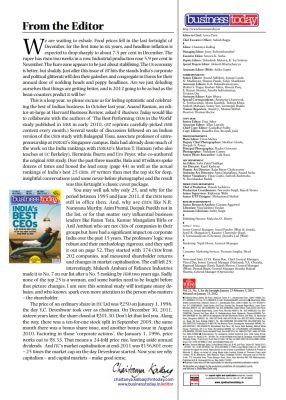India’s Best CEOs
[Business Today]
Published date: 5th Feb 2012
We are waiting to exhale. Food prices fell in the last fortnight of December, for the first time in six years, and headline inflation is expected to drop sharply to about 7.5 per cent in December. The rupee has risen two weeks in a row. Industrial production rose 5.9 per cent in November. The Euro zone appears to be just about stabilising. The US economy is better, but shakily. Just after this issue of BT hits the stands India’s corporate and political glitterati will don their galoshes and congregate in Davos for their annual dose of nodding heads and peppy headlines. Are we just deluding ourselves that things are getting better, and is 2012 going to be as bad as the bean-counters predict it will be?
This is a leap year, so please excuse us for feeling optimistic and celebrating the best of Indian business. In October last year. Anand Raman, an editor-at-large at Harvard Business Review, asked if Business Today would like to collaborate with the authors of “The Best Performing CEOs in the World’ study published in HBR in early 2010. (BT reprints carefully-picked HBR content every month.) Several weeks of discussion followed on an Indian version of the CEOs study with Balagopal Vissa, associate professor of entrepreneurship at INSEAD’s Singapore campus. Bala had already done much of the work on the India rankings with INSEAD’s Morten T. Hansen (who also teaches at UC Berkeley), Herminia Ibarra and Urs Peyer, who co-authored the original HBR study. Over the past three months, Bala and BT editors spoke dozens of times and honed the lead essay (page 44) as well as the actual rankings of India’s best 25 CEOs. BT writers then met the top six for deep. insightful conversations (and some never-before photographs) and the result was this fortnight’s classic cover package.
You may well ask why only 25, and why for the period between 1995 and June 2011, if the CEOs were still in office then. And, why are CEOs like N.R. Narayana Murthy, Azim Premji, Deepak Parekh not in the list, or for that matter very influential business leaders like Ratan Tata, Kumar Mangalam Birla or Anil Ambani who are not CEOs of companies in their groups but have had a significant impact on corporate India over the past 15 years. The professors’ logic was robust and their methodology rigorous, and they spell it out on page 52. They started with 374 CEOs from 202 companies, and measured shareholder returns and changes in market capitalisation. The cull left 25; interestingly, Mukesh Ambani of Reliance Industries made it to No. 7 on our list after a No. 5 ranking by HBR two years ago. Sadly, none of the top 25 is a woman, and some battles need to be fought before that picture changes. I am sure this seminal study will instigate many debates, and who knows, spark even more attention to the person who matters -the shareholder.
The price of an ordinary share in ITC Ltd was ₹250 on January 1. 1996, the day Y.C. Deveshwar took over as chairman. On December 30, 2011, sixteen years later, the share closed at ₹201.30. Don’t let that fool you. Along the way, there was a ten-for-one stock split in September 2005; the same month there was a bonus share issue, and another bonus issue in August 2010. Factoring in those ‘corporate actions’, the January 1. 1996, price works out to ₹8.33. That means a 24-fold price rise, leaving aside annual dividends. And ITC’s market capitalisation at end-2011 was₹156,801 crore -25 times the market cap on the day Deveshwar started. Now you see why capitalism and capital markets-make good sense.






